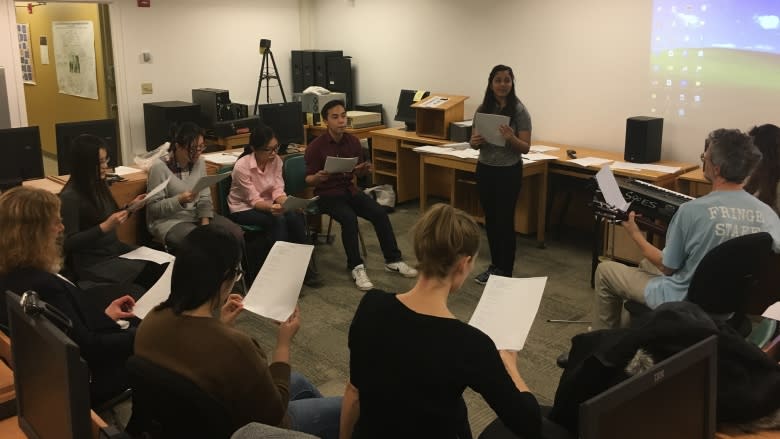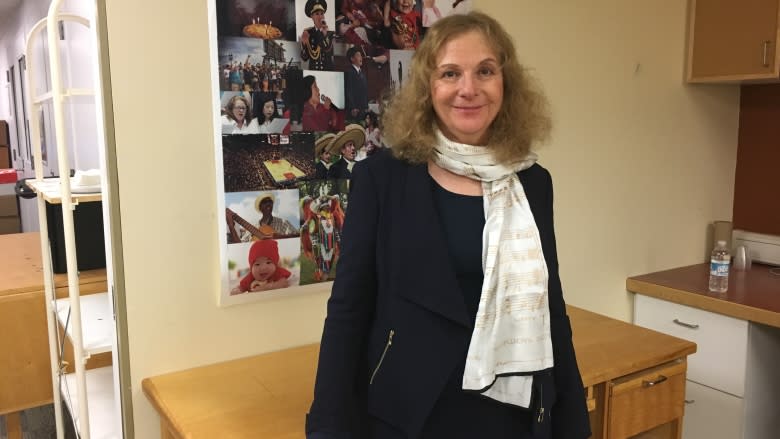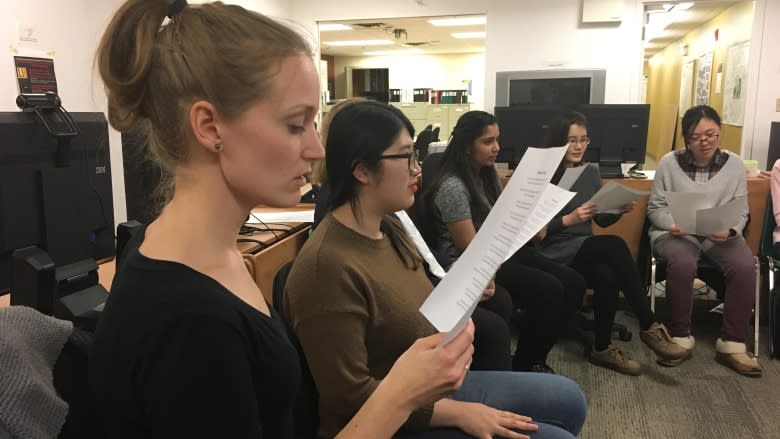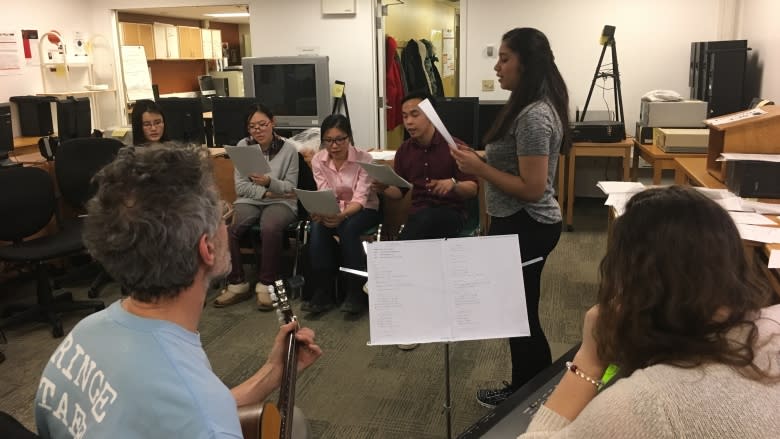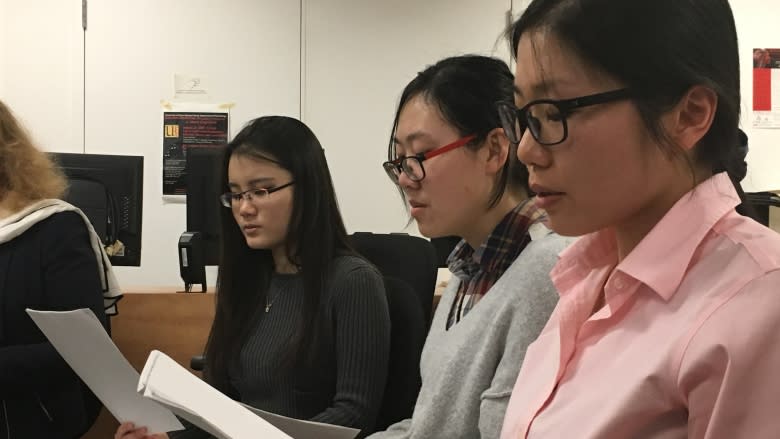'Making a beautiful sound together': UPEI's multicultural choir is really a psychology experiment
The dozen or so UPEI students who gather to sing multicultural songs don't really know it, but they're part of an experiment — not a dark and dastardly experiment, but a fun, musical one.
For the past six years in the basement of the Robertson Library on campus, students and community members have been urged to come have fun learning international songs together. It's part of the Advancing Interdisciplinary Research in Singing or AIRS project, which began in 2009 with a $2.5 million federal grant to study singing — its effect on well-being, how singing develops, and how singing should be taught and used to teach other things.
"Anyone can share a song from their culture," said Kelvin Jacinto, one of the choir's student assistants, as he teaches fellow choir members an upbeat song from his native Philppines. "There is no pressure."
'Everybody is in the same challenging boat'
Psychology professor Annabel Cohen has been studying how singing helps people understand one another's cultures and break down barriers.
"If your own English skills are poor, then it's difficult to actually enter into conversation with people who you might like to be friendly with," she points out.
"Here, you don't have to do that because everybody is in the same challenging boat of learning the song of another language and they have fun making mistakes or just have fun making a beautiful sound."
Choir members — most of whom are international students — usually listen to a YouTube version of the song, then a chorister leads the others in learning it, with help from an accomplished keyboard and guitar player.
Each week the choir repeats the songs and adds new ones until it has a solid repertoire at the end of an academic term. They perform occasionally at international gatherings on campus and festivals. There's always a fun round of musical chairs and pizza at the end of practice.
'Wonderful interactions'
"We've learned a lot from this," said Cohen. "There's always been examples of wonderful interactions among the students and very positive things that have come out of it that have been so encouraging, to keep continuing with this activity."
Cohen has observed and surveyed the students at the beginning and the end of the term to gauge their perceived well-being, and her findings are, at first glance at least, fairly simple: students join the choir to have fun, and they rate their satisfaction highly.
"They know that this is being sponsored by the AIRS project... they know there's a connection, but they're not informed as to especially the underlying reason for doing this," Cohen explained. "It is a bit of an experiment."
'The value of singing'
One of Cohen's goals is that the choir be used as a model for multicultural singing groups on other campuses. She points out UPEI has students now from 60 different countries, and this is a great way for them to learn from one another.
"They all bring their songs, and it's one way of the Canadian students immediately having contact with students from many different countries," she said, as well as access for students from out of the country to find friends.
Singing together produces positive feelings about others more quickly than other common activities, said Cohen, citing research from psychologists at the University of Oxford affiliated with the AIRS project. She points to another AIRS researcher in Portugal who studied the effect on young children of singing a minority culture's songs — the result: less prejudice. So could singing be used in a similar way in Canadian schools?
"It is part of our mission, now that we've been through many years of the AIRS project, to try to raise consciousness of the value of singing in our society — we believe it can be used in many ways," Cohen said.
"It is particularly relevant to the extent to which the province is welcoming immigrants from every country, so it's a way of sharing culture," Cohen said. "We're not really taking advantage of the value of this."
'We all just laugh'
"I meet so many people and I'm so much less stressed [afterward]," enthused Khousmita Gopaul from Mauritius, a first year student of diversity and social justice.
Although she already speaks three languages, Gopaul would like to learn more — one of the reasons she joined the choir. "We sing African, Spanish songs and I don't know the pronunciations and so we all just laugh!"
Other choristers say the same thing.
"Normally we can't connect with so many cultures," said Amber Yi of China, adding, "I like singing but I'm not so good, so it's a chance to practice."
"We did a lot of karaoke in Malaysia," adds Faye Lim, looking to re-create a bit of that fun. She heard about the choir from a classmate in Spanish class, and came to help teach the Cantonese version of a Malaysian song.
Publish or perish
A series of academic volumes on the AIRS singing studies will soon be published, which Cohen said will include articles on the multicultural choir and will be a "major final milestone" for the project. It may also produce a book for the general public talking about the psycho-social value of singing.
"We came to realize how significant singing is at every stage of the life span," from babies to mid-life crises, she said.
Cohen and others are also planning a Sing Fest to engage the public in singing activities, possibly for World Singing Day October 21.
- MORE P.E.I. NEWS I P.E.I. government welcomes seafood federal funding, partnership
- MORE P.E.I. NEWS I Everybody into the pool! 8-ball league looking for novice players


